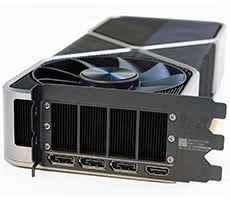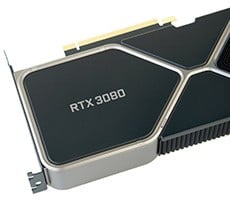Haswell-E Debuts: Intel Core i7-5960X Processor Review
Our Summary and Conclusion
Performance Summary: The Haswell-E based Core i7-5960X’s performance is somewhat of a mix between kick-ass and meh. In general, the Core i7-5960X is faster overall than Intel’s previous-gen flagship, the Ivy Bridge-E based, 6-core Core i7-4960X. In single threaded tests, where the Core i7-5960X's additional cache and memory bandwidth aren't fully utilized, however, the 4960X's higher clocks can usually push it ahead. In multi-threaded tests though, the 5960X's two additional cores make it significantly faster, despite its frequency deficit. Our gaming and graphics tests also showed the Core i7-5960X to be mostly superior to the previous-gen, though there are going to be times where its additional compute resources are under utilized and higher-clocked processors will be faster.

Intel Core i7 and Core i7 Extreme Processor Packaging
![]() The Core i7-5960X and X99 chipset mark the first major overhaul to Intel’s enthusiast-class desktop line-up since 2011, when Sandy Bridge-E and the X79 Express first hit the scene. In many respects, Haswell-E and the X99 are leaps and bounds better, as evidenced by our multi-threaded benchmark results and the plethora of additional features offered by X99. On some levels though, it feels as if Intel hasn’t—or wasn’t able too—push the boundaries too much further. Considering Haswell-E features updated, more power-efficient execution cores, and Intel has had a long time to tweak their manufacturing processes, we expected Haswell-E to be an across the board improvement. It is still an extremely impressive powerhouse of a processor, but depending on your particular use-case, Haswell-E may not be an upgrade over the older Core i7-4960X, or even the Core i7-3960X for that matter.
The Core i7-5960X and X99 chipset mark the first major overhaul to Intel’s enthusiast-class desktop line-up since 2011, when Sandy Bridge-E and the X79 Express first hit the scene. In many respects, Haswell-E and the X99 are leaps and bounds better, as evidenced by our multi-threaded benchmark results and the plethora of additional features offered by X99. On some levels though, it feels as if Intel hasn’t—or wasn’t able too—push the boundaries too much further. Considering Haswell-E features updated, more power-efficient execution cores, and Intel has had a long time to tweak their manufacturing processes, we expected Haswell-E to be an across the board improvement. It is still an extremely impressive powerhouse of a processor, but depending on your particular use-case, Haswell-E may not be an upgrade over the older Core i7-4960X, or even the Core i7-3960X for that matter.

Initial Haswell-E Line-Up -- Click To Enlarge
The Core i7-5960X isn’t the only Haswell-E based processor coming down the pipeline; Intel also has the six-core / 12-thread Core i7-5930K and six-core / 12-thread Core i7-5820K in the works as well, with prices ranging from $389 for the 5820K to $999 for the flagship Core i7-5960X. We should also point out that the 5820K has fewer PCIe lanes—28 vs. 40 in the higher-end parts. As has always been the case, if you want to enjoy the benefits of Intel’s top-of-the-line desktop processor line-up, you’ll have to shell out some big bucks, but we’re sure you already knew that. Flagship processors from Intel have never been cheap. And neither are compatible motherboards, and in this case, DDR4 memory kits.
In the end though, it is fair to say the Core i7-5960X is Intel’s fastest desktop processor to date. But because its clocks aren’t quite as high as the Core i7-4960X, Intel’s new flagship is not the undisputed performance champion. The Core i7-5960X is still an impressive piece of kit, there are just some caveats to consider if you’re in the market for an extreme processor like this one. With that said, if money was no object, the Core i7-5960X is the king of the hill. It’s just not the absolute beast it could have been if Intel had decided to crank things up to 11.

|
|
|
|
|






